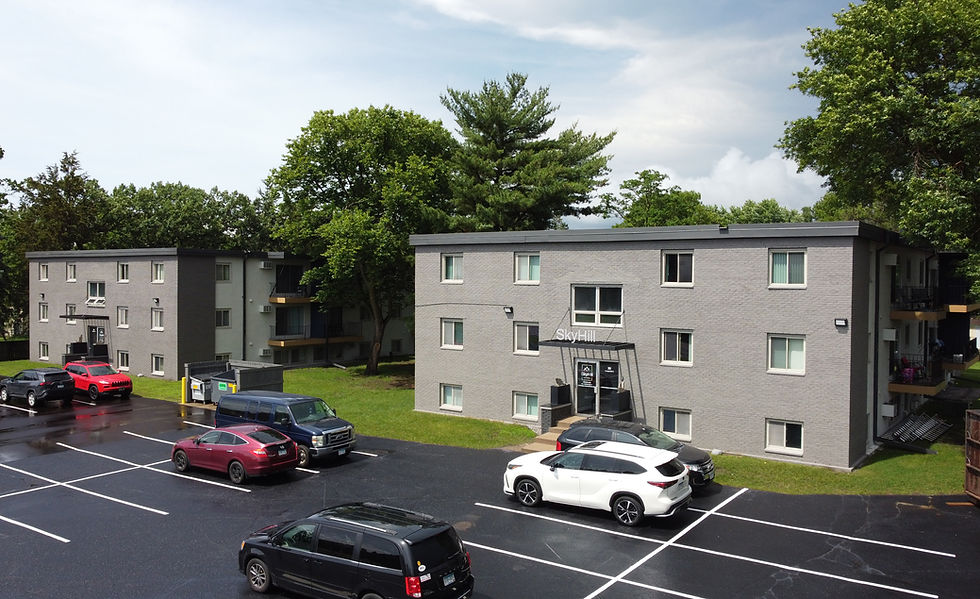Why the Buy & Hold strategy unleashes real estate's full potential
- Feb 5, 2024
- 3 min read
Updated: Jan 7, 2025
Ridgeview Property Group buys multifamily communities and holds them long-term, typically 20+ years. Our goal is to provide investors with a strong cash-on-cash return, grow their equity, and minimize taxes along the way. Holding long-term allows the invested equity to grow and compound year after year, unfettered by capital gains tax and depreciation recapture. Follow along in this week’s newsletter as we outline the many benefits of this strategy.
Selling The Asset Triggers Taxes and Depreciation Recapture
Expensing depreciation is a key benefit of real estate ownership and allows investors to reduce or negate paying taxes on their investment year after year. However, If that asset is sold the sale triggers capital gains taxes and depreciation recapture. When a real estate investor pays capital gains and depreciation recapture every 5-10 years, it can severely impact their overall returns.
Refinancing Is Key
We want our investors to participate in the tax-efficient investment growth that real estate offers. This is why we advocate for the buy-and-hold strategy. Instead of selling the asset when the acquisition business plan has been completed, we tap into the property’s equity via a refinance. A cash-out refinance allows us to return investor capital while minimizing capital gains and avoiding triggering depreciation recapture. Our goal is for our investors to receive their full investment back after the first refinance and continue to receive cash flow thereafter for decades to come.
Utilizing The Power of the 1031 Exchange
A 1031 Exchange allows Ridgeview and its investors to experience the compounding effects of real estate to the max. The key to compounding is to capitalize on a successful project and redeploy the gains into a bigger/better asset while utilizing a 1031 Exchange. All investors in the relinquished property are now the proud owners of the newly acquired property. Following the rulebook of the 1031 Exchange ensures that the investors successfully defer any taxes from the sale. Depreciation recapture is also deferred and tied to the new asset.
Effective Legacy Planning
Opting for long-term structured real estate investments can be an incredible vehicle for legacy planning. As outlined in our Depreciate, Defer, Die article, when ownership interest in real estate is transferred to heirs at death, the heir is given a stepped-up basis, and all capital gains and depreciation recapture from previous years/decades are wiped out.
Investing through a real estate firm such as Ridgeview Property Group presents an alternative to the traditional route of personally acquiring real estate and leaving it to your children. With Ridgeview, an heir can inherit valuable real estate with a professional operator already at the helm; no operational knowledge or management responsibilities are necessary.
Less Deal Churn
By holding properties for the long term, our investors can sustain the benefits of real estate ownership without needing to seek out new deal offerings every 5-10 years. This approach also allows Ridgeview to develop a deep familiarity with the property and its nuances, enhancing management efficiency and reducing operating costs. Lastly, as long-term owners, we can form deeper ties within the community and local government.
In Closing
There are so many benefits to holding income-producing real estate long-term. Expensing depreciation provides an incredible tax shelter, provided you don’t sell the asset outright. The 1031 Exchange allows for profiting off a successful sale while plowing those profits into a bigger and better property without triggering taxes. Avoiding taxes can be possible when including real estate investments in your legacy planning. Long-term ownership comes with incredible benefits and Ridgeview plans to continue capitalizing on these advantages.
-Ben Michel
Ben Michel is the founder of Ridgeview Property Group, an investment firm specializing in acquiring multifamily real estate. Register Here to be notified of available investment opportunities.
Market News
100% Bonus Depreciation May Be Coming Back
New comprehensive tax legislation that includes bringing back 100% bonus depreciation was passed in the House of Representatives Wednesday by a margin of 357 to 70.
The bipartisan bill still needs to be voted in the Senate.
Tips & Tricks
Terms:
Stepped-Up Basis – The stepped-up basis provision adjusts the value, or “cost basis,” of an inherited asset (stocks, bonds, real estate, etc.) when it is passed on, after death. This often reduces the capital gains tax owed by the recipient. The cost basis receives a “step-up” to its fair market value, or the price at which the good would be sold or purchased in a fair market. This eliminates the capital gain that occurred between the original purchase of the asset and the heir’s acquisition, reducing the heir’s tax liability.




